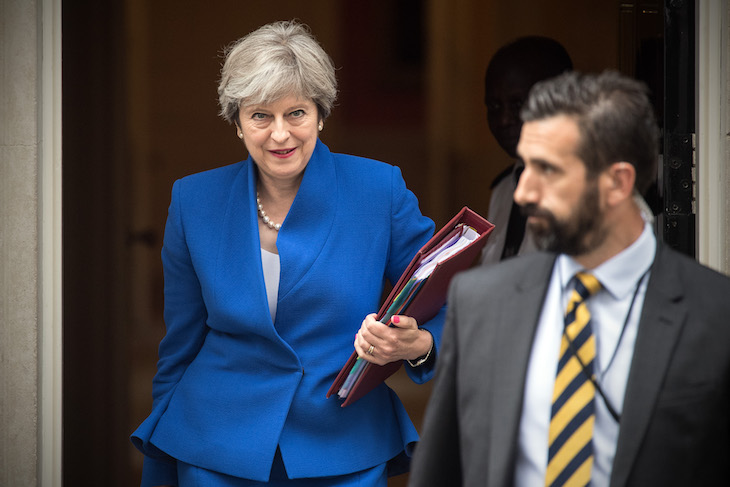It used to be said that loyalty was the Conservatives’ secret weapon. While other parties might descend into internecine warfare, the Tories would always, when circumstances demanded, show just enough respect for their leader. The words ‘loyalty’ and ‘Conservative’, -however, lost their natural affinity during the Major years. Since then, to borrow a phrase from the left, the leadership of the party has descended into a state of permanent revolution. After the failure of her general election campaign, Theresa May seems to have become a tortured prisoner of her cabinet.
Talks of leaks are exaggerated. It’s quite true that our political editor, James Forsyth, was able to disclose a row inside cabinet over Philip Hammond saying that driving a train was so easy ‘even’ a woman could do it. He did not come by this because ministers were queuing up to spill the beans to journalists: had this been the case, the story would not have taken five days to emerge. And the point is not Hammond’s verbal slip, but the mood inside the government. His colleagues set upon him because they have very little respect for him: a dangerous dynamic in a government. Nor do they fear Theresa May who, as they know, will walk the plank when they tell her the moment is right.
The Tories are open to charge that they are putting their own feuding ahead of national interest
But Britain now needs leadership and the Conservative party seems unable to provide it. At a time when Brexit negotiations are under way, there needs to be clear articulation of our aims — and yet we hear almost nothing. The Tories are open to the charge that they are putting their own feuding ahead of the national interest.
It is to Theresa May’s credit that she has not run for the door, as David Cameron did after the EU referendum result. She squandered her party’s majority in a needless election, where she sought a highly personal mandate that would have justified her rather dictatorial form of governing. In other words, she overreached, and was -corrected by the voters. But the inescapable fact remains that she is Prime Minister, and the Tories cannot ask her to stay in place without allowing her to govern.
Over the coming months the govern-ment needs to present a strong and consistent line to EU negotiators. Mrs May’s Lancaster House speech was an admirably clear vision for Brexit and she ought to be campaigning on it, as should all members of her cabinet. Fussing about a ‘hard’ or ‘soft’ Brexit is a pointless distraction: the aim is an open Brexit, and all members of the cabinet should devote themselves to articulating it. This is especially true for Michael Gove, the Environment Secretary and Boris Johnson, the Foreign Secretary, the government’s two most gifted communicators. They are both distressingly silent, perhaps worried that any comment will be seen as a leadership bid.
If the Tories are paralysed by fear of each other, then the Labour party will make headway. So they ought to come to an agreement: that Mrs May should stay, at least until the end of the Brexit negotiations in March 2019. And meanwhile, they ought to be free to start governing again — her cabinet members trusted, as they were under David Cameron, to pursue their agendas. If Justine Greening has plans to reform education, let us hear them; she is now free of the burden of having to bring back grammar schools. In the unlikely event that David Gauke has imaginative plans to build on the welfare reform agenda that he inherited, he should be encouraged to proceed.
Following the election result, the government is starting the EU negotiations from a position of weakness, but there is no reason to assume that this should cloud the eventual outcome. Whatever her other faults, Mrs May has laid out her stall in very logical fashion. She was quite right to state that no deal is better than a bad deal — and so remind EU negotiators that they are risking -losing unfettered access to UK markets. It was David Cameron’s failure to do this which doomed his efforts to renegotiate Britain’s relationship with the EU before the referendum. When he should have been reminding the EU that it was in danger of losing its second biggest financial contributor, he was instead already campaigning for a Remain vote. It is little wonder that Donald Tusk and his team treated him with contempt.
Theresa May, too, has a clear sense of what she hopes to achieve for the negotiations: for Britain to leave the single market and the customs union, while negotiating a free-trade deal and opting back into selected areas of pan-European co-operation. It is a far clearer picture than has been -presented by Labour, which is still torn between -Corbyn’s anti-EU instincts and the pro-EU views of its parliamentary party.
Many Conservatives will have come to the conclusion that in Theresa May they were mis-sold a leader, that her supposed appeal to the general public has proven to be illusory, that she lacks warmth, ideas and the inspiration to lead. But with the government engaged in its most important negotiations of the past half century, she remains the only practical choice as leader. Aspirant -leaders, kingmakers and assorted -malcontents should leave their plotting for another day.






Comments